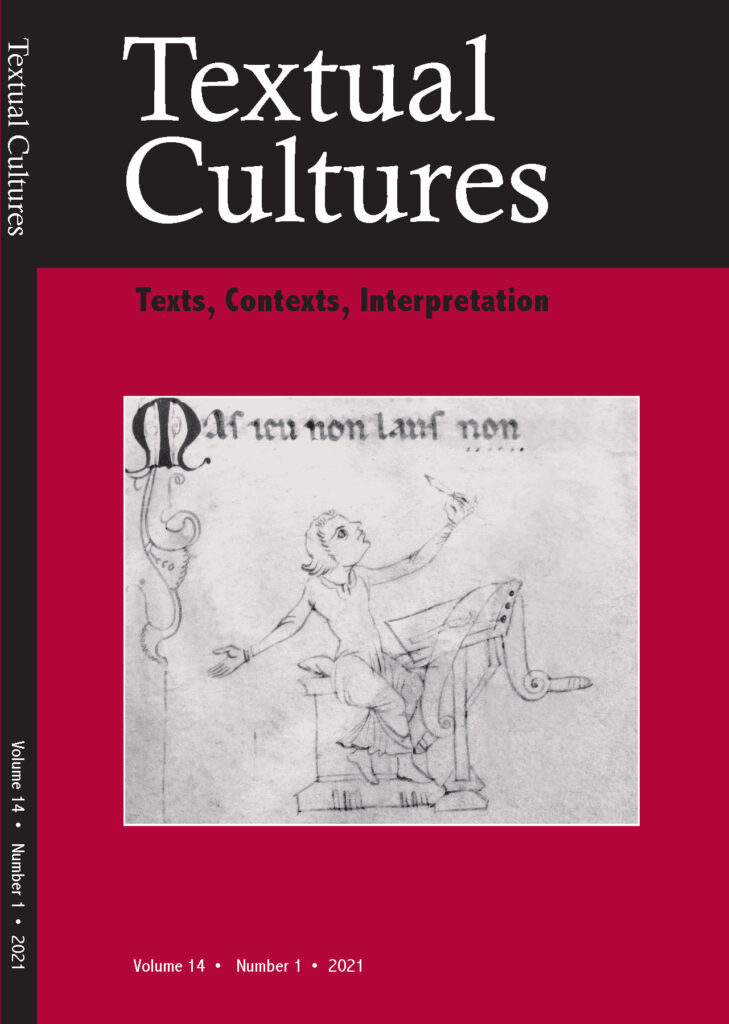Textual Cultures: Texts, Contexts, Interpretation has recently published its new issue for 2021. Published annually since 1983, Textual Cultures is devoted to the study of textual editing. The journal has been an IU ScholarWorks open access journal since 2017.
While Textual Cultures has always focused on texts, textuality, and textual editing, the journal has sought to cultivate “an ever more inclusive and multi-voiced approach to issues of textual editing,” encompassing “redefinitions of textuality,” considerations of “diverse textual cultures,” and explorations into emerging cyberspace contexts.

With the 2021 issue, the editors wanted to “evoke rather than replace” the papers that would have constituted the cancelled March 2020 Society for Textual Scholarship conference (1). This issue’s articles represent over half of the original entries in the conference program. Entitled “Borders of the Book,” this “lost conference” was to explore the “the translations and migrations that transmit texts and that texts themselves have prompted” (1). The issue begins with the two conference keynotes, followed by a theoretical case-study of the editorial theorist Paul Eggert, and concludes with articles addressing a number of different historical eras.
Roger Chartier’s keynote, “Genealogies of the Study of Material Texts,” outlines the unique trajectory of French textual scholarship. Chartier notes that twentieth-century French book history deemphasized the material aspects of the printing process to focus, instead, on the book as both a commodity and a force of change (20). Under the influence of book historian Henri-Jean Martin, French scholarship also came to focus on the significance of formal elements like typeface and text layout. While Anglo-American and Italian works were gradually integrated, French textual scholarship has retained a distinctive focus on the ways in which the form of a text influences its meaning and reception.
In his discussion of Eggert’s theories, Matt Cohen stresses the importance of understanding a scholarly edition of a work as one editor’s interpretation or argument about the meaning of a particular text. Using Eggert’s pragmatic approach, scholarly editors keep the needs of “a potentially broad readership” in mind while, at the same time, recognizing the importance of providing a useful interpretation of a work (28). From this perspective, the editor strives not to create the definitive edition of a work, but to offer new ways of understanding its significance.
One of the highlights of the remaining essays is Jolie Braun’s discussion of the memoirs of nineteenth-century women book canvassers. Braun explains that, in the late 1800s, a number of women became book canvassers – traveling salespeople “who sold books on behalf of subscription publishers” (124). Although canvassing offered both independence and the opportunity to promote literacy, women canvassers had to balance cultural expectations with the traits of successful canvassing: women were expected to be docile and ladylike, but canvassers had to be assertive and tenacious. Braun’s essay demonstrates the importance of these canvassing memoirs, which offer detailed insights into the complicated challenges women faced working in the book trade (129).
These are just a few highlights from an ambitious issue that exemplifies Textual Culture’s innovative approach. As editor Marta Werner explains, these proceedings “suggest that change is afoot in our ever-emergent field” (2).
Leave a Reply